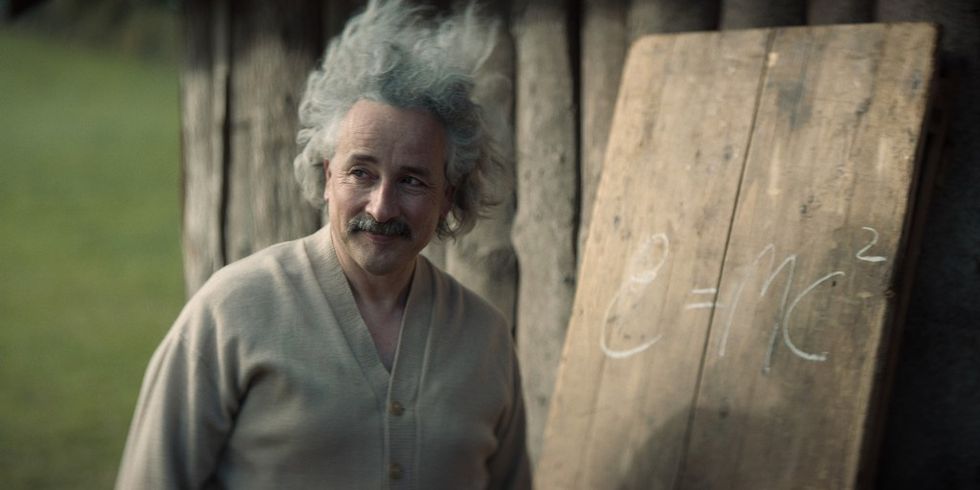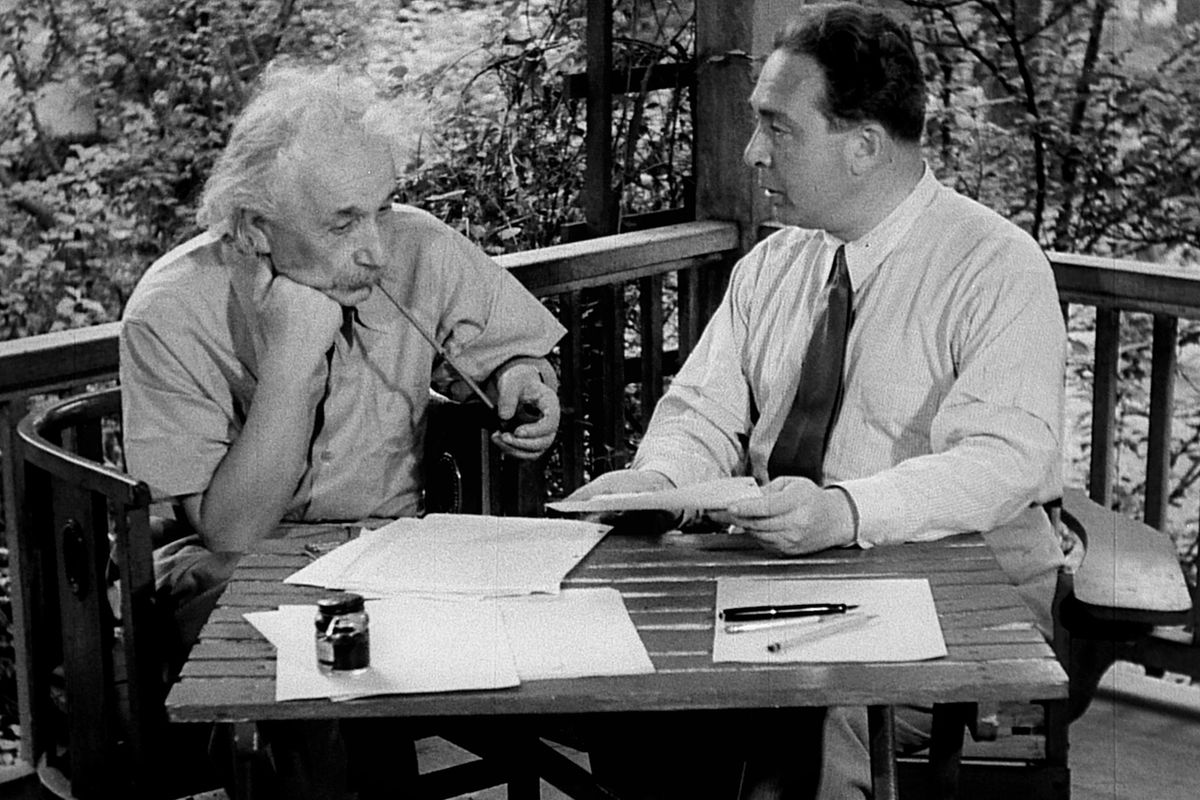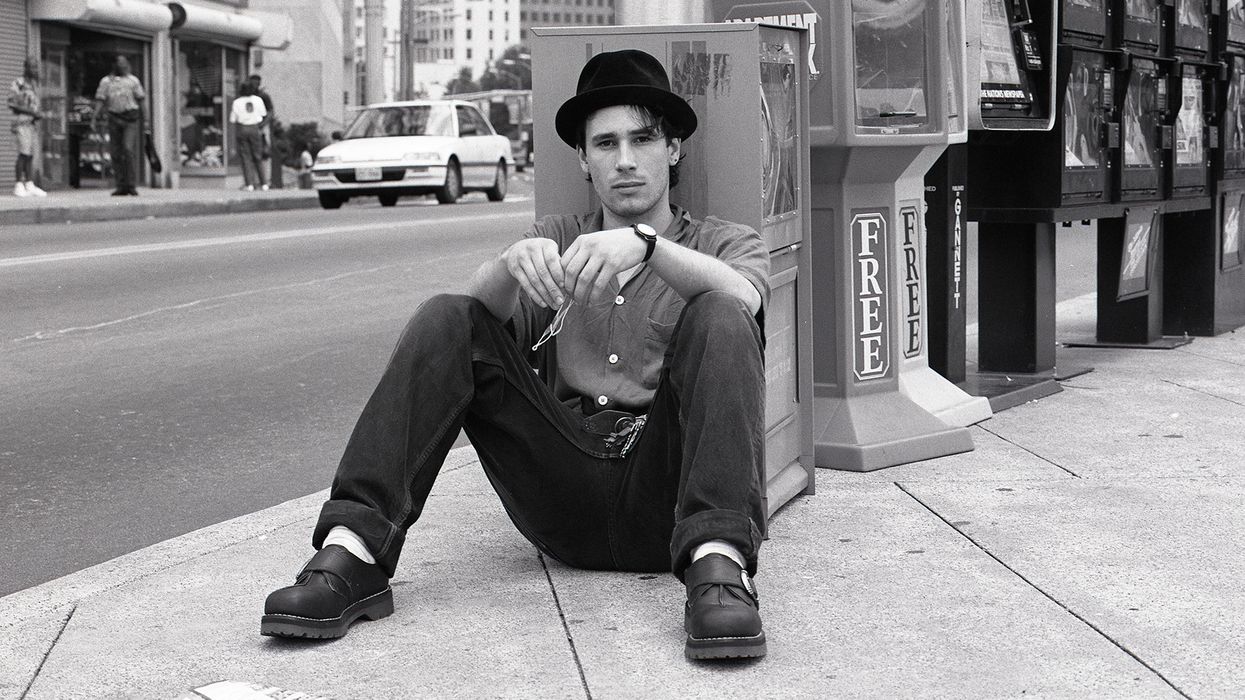The awards juggernaut Oppenheimer provides a blockbuster treatment of one scientist’s profoundly mixed feelings regarding his role in the creation of the atomic bomb, and its subsequent use in destroying the Japanese cities of Hiroshima and Nagasaki. Now Netflix has dropped a much slimmer but thematically similar docudrama, Einstein and the Bomb, that packs a wallop in detailing how the man widely considered the father of atomic energy came to influence the innovations of the Manhattan Project, and how he lived to regret it.
This is a docudrama in the truest sense of the word. Director Anthony Philipson weaves dramatic scenes of Einstein (capably played by a twinkle-eyed Aidan McArdle) with documentary footage; the screenplay uses only words spoken or written by Einstein himself. The dramaturgy can get a little clunky, and the hair and makeup won’t be winning any Oscars. But that’s not really the point. In choosing to forego either a standard documentary format or a low-budget biopic approach, the filmmakers manage to make history feel more human.
The film could have also been called Einstein and the Nazis. Ample footage of Hitler’s rise and the Third Reich’s atrocities fill the screen as the first half of the film details how Einstein’s theory of relativity, combined with the fact that he was Jewish, led the Nazi regime to denounce him and his suspiciously abstract findings in the early 1930s. Einstein, in turn, got an early glimpse of, and sounded an early alarm over, the evil that Hitler was capable of committing. This is crucial context for what would follow: Einstein, by then world famous and living in Long Island, wrote to President Roosevelt in 1939, warning that Germany might be in the process of developing atomic weapons, and suggested the U.S. get busy doing the same. But he never considered the possibility that those weapons would be used to annihilate the civilians of a different country’s cities.

We see McArdle’s Einstein explain his radical pacifism, a pacifism so strenuous it could, ironically, take on a warrior-like quality. We see him take refuge from Germany in a little hut on a Norfolk heath under the hospitality of Commander Oliver Locker-Lampson, a British politician and naval reserve officer played by Andrew Havill; this is also where his life is guarded by two young women with guns at the ready. All true, and all quite intriguing.
As in so many crisp documentaries, the editor is the unsung hero here. Simon Barker nimbly darts between timeframes, attaching the right documentary footage to the right dramatic scene, and keeps everything humming; Einstein and the Bomb is only 76 minutes long, and it feels even shorter. As the film sets up its historical context, detailing Einstein’s 1932 flight from Germany, his respite in England, and, finally, his voyage to the U.S., where he lived out his life, you might start to wonder if this is not a stand-alone doc but the first episode of a series. When do we get to Los Alamos? Where’s Oppenheimer? Then you remember: Einstein wasn’t at Los Alamos. He was deemed too much of a security risk. But his ideas were there, chiefly the guiding atomic principle that a small amount of mass can generate a tremendous amount of energy.
This Einstein is a fervent peacenik who saw in Nazi Germany an existential threat to peace everywhere, and to Jewish people in particular. He later felt great anguish at his role in opening up what he called the “Pandora’s box” of atomic weapons, the carnage of Hiroshima and Nagasaki, and the subsequent nuclear anxiety we experience to this day. In Oppenheimer, Einstein is portrayed by Tom Conti in passing and only as he relates to the protagonist. Here he gets to bear his soul. This is frankly the kind of thing Netflix could and should do more of. It looks inexpensive but sharp, it doesn’t reek of sensationalism, and it doesn‘t feel like a cobbled together romp through history. It has a point and a vision worthy of its subject.












 Jean Jacket: Repull/Jewelry: Personal collection
Jean Jacket: Repull/Jewelry: Personal collection Hat: Xtinel/Dress shirt and vest: Raphael Viens/Jewelry: Personal Collection & So Stylé
Hat: Xtinel/Dress shirt and vest: Raphael Viens/Jewelry: Personal Collection & So Stylé  Dress: Helmer/Jewelry: Personal Collection
Dress: Helmer/Jewelry: Personal Collection  Jewelry: Personal Collection
Jewelry: Personal Collection  Dress: Helmer/Jewelry: Personal Collection
Dress: Helmer/Jewelry: Personal Collection 

 Catering Presented By The Food DudesPhoto by Snapdrg0n
Catering Presented By The Food DudesPhoto by Snapdrg0n Catering Presented By The Food DudesPhoto by Snapdrg0n
Catering Presented By The Food DudesPhoto by Snapdrg0n Catering Presented By The Food DudesPhoto by Snapdrg0n
Catering Presented By The Food DudesPhoto by Snapdrg0n
 Photographer: Raphaëlle Sohier / Executive production: Elizabeth Crisante & Amanda Dorenberg / Design: Alex Filipas / Post-production: Bryan Egan/ Headpiece: Tristan Réhel
Photographer: Raphaëlle Sohier / Executive production: Elizabeth Crisante & Amanda Dorenberg / Design: Alex Filipas / Post-production: Bryan Egan/ Headpiece: Tristan Réhel Photo: Raphaëlle Sohier
Photo: Raphaëlle Sohier Photo: Raphaëlle Sohier/ Photo production: Bryan Egan/ Blazer:
Photo: Raphaëlle Sohier/ Photo production: Bryan Egan/ Blazer:  Photo: Raphaëlle Sohier/ Blazer: Vivienne Westwood/ Skirt :
Photo: Raphaëlle Sohier/ Blazer: Vivienne Westwood/ Skirt : 
